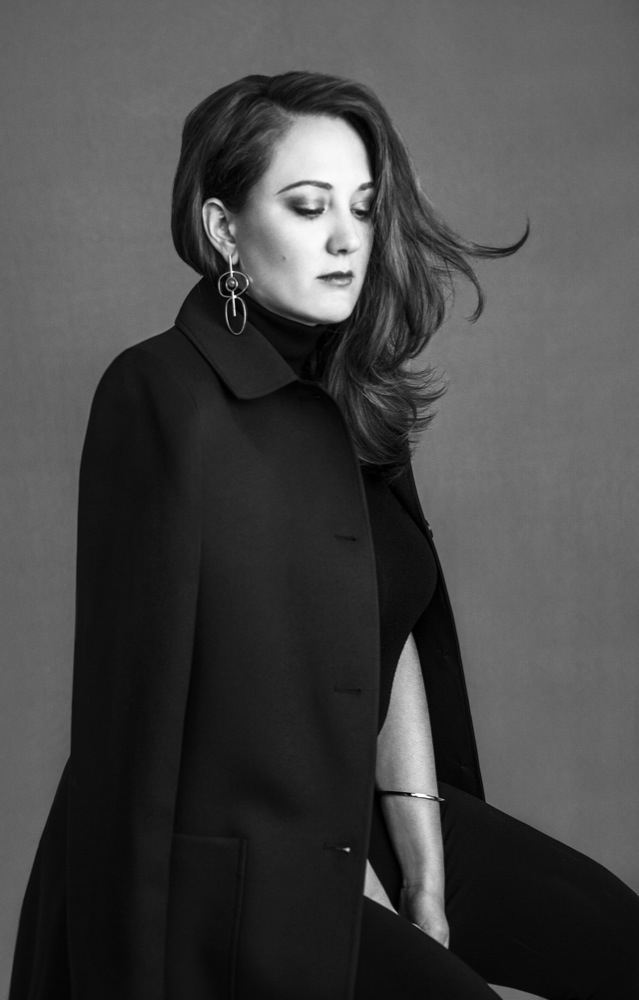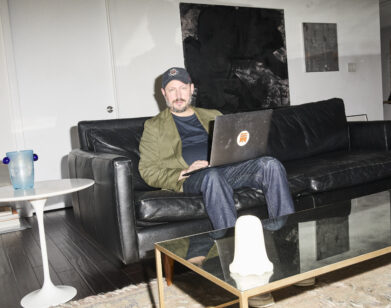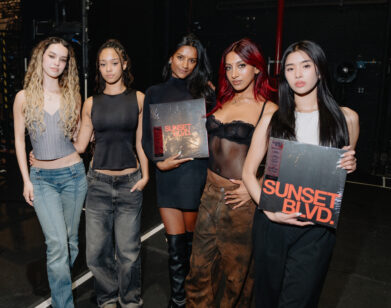Keeping Company With Jacqueline Novak
JACQUELINE NOVAK IN NEW YORK, FEBRUARY 2016. PHOTOS: VICTORIA STEVENS. STYLING: CAROLINA ORRICO. HAIR: NATE ROSENKRANZ/ HONEY ARTISTS USING ALTERNA HAIR CARE. MAKEUP: AYAKA NIHEI USING NARS. STYLING ASSISTANT: HANNA KUESSNER.
In her literary debut How to Weep in Public: Feeble Offerings on Depression From Someone Who Knows (Three Rivers Press), Jacqueline Novak explores guilt and anxiety through humor and honesty. “There will be no outright promises of help,” the New York-based comedian warns in the introduction. “I’m just here to keep you company while you waste away in the prison cell of your mood…like that guard who provided Saddam Hussein with Doritos during the days leading up to Hussein’s execution.”
In spite of her self-effacing tone and the caveat she puts forward in the title, Novak’s offerings seem far more genuine than they do feeble. “I was really aware of how when you’re reading the book, you can feel comforted by the presence of the author,” she explains. “I started writing it thinking of it as this letter through time…I’m having faith that you’re out there, somewhere in the future, and you can have faith while you’re reading it that me, somewhere in the past, wrote it thinking of you,” she continues. “I wanted to give [the reader] permission. You could read it 1,000 times and trust me—my soul is in there every single time. I don’t want you to feel alone.”
Since she began writing How to Weep two and a half years ago, Novak has consistently performed stand-up throughout New York and, in 2014, released her first comedy album, Quality Notions. Her immediate confidence in approaching taboos is as present in her stand-up as it is in her writing: female pleasure, the constant dearth of pizza at a pizza party, and Freudian repression are all on the table. Tonight, in celebration of How To Weep in Public‘s release, her standing weekly show at Cake Shop (which she co-hosts with John Early) will feature guests Ilana Glazer, Dave Hill, and Isaac Oliver.
HALEY WEISS: When you started the book, you were living at home with your parents [in Westchester] and reading self-help books. At that point in time did you want to write for yourself, seeking a cathartic experience, or did you think, “I need to make the antidote to these books that I’m reading”?
JACQUELINE NOVAK: I truly love self-help and I buy-in really hard and at the beginning of each book. I’m convinced that as long as I do what they say, the answer is there. I get the equivalent of when someone has dollar signs in their eyes and thinks they’re going to be rich; I get these sort of emotional dollar signs. I credit a lot of things I’ve done to taking on a particular self-help [method]. Like starting stand-up comedy, I credit to doing a specific exercise in The Artist’s Way, where she asks you, “If you could do anything and know in advance you wouldn’t fail, what would you do then?” It’s a question we don’t normally think of; we close things off based on what we think we’re capable of. I was doing comedy and writing [when I read that] but it made me specifically picture doing stand-up comedy, which I had always imagined myself doing but [thought it would be] particularly horrible or not me. But then I thought, “What if it was me doing stand-up but for some reason people liked it?” That changed my thinking and I did it.
[When living with my parents,] I was also reading all these books about depression, which I found really comforting. Some people think, “You’re depressed. Why would you want to read about depression?” but for me it was like being in a warm bath; you don’t want cold water splashed on you. It legitimized my feeling of being depressed… I was writing a lot, but the level to which I was depressed at the time was bleeding through everything I was writing. You can be funny about anything but at the time I just felt like it was stinking everything up. I was trying to fight it like I was in this other state, as though I was still on the go, living my “city girl, cool life,” writing jokes about sleeping with guys, while meanwhile I’m in my parent’s basement waiting to watch American Idol with them later. I thought, “I can’t escape this. It’s coming out in the writing. Is there any benefit to this?”
When you’re depressed you can isolate yourself because you know that you can’t provide what you feel you need to socially; you don’t think you can drum up the energy. It’s as though you feel you won’t register as a human. I think people feel very misunderstood if they do attempt, when depressed, to explain how they’re feeling to other people. You only want to let people in the door who are also depressed or really get it. I thought if I could write from that [state], even if it’s so clearly steeped in my own depression and even if it’s really negative, at least it will be authentic to those people. Ultimately, I couldn’t finish it in that state. I wrote a bunch of stuff and put it away. I did get my life back on track, I moved back into the city… The weird thing is I finished the book from a better place, so that’s why it had to have some chronology in it.
WEISS: When you took a break from writing and moved back to the city, is that when you started working on Quality Notions?
NOVAK: [Moving back] made it a lot easier to do nightly stand-up around town. Actually, when I sold the book and knew I would have a book coming out at some point in the future, I realized, “I’ve got to get my comedy album out.” If I’m claiming while I’m walking around trying to promote a book, or I’m writing on the back [cover], “Jacqueline Novak is a comedian,” there has to be evidence. It forced me in a good way. I [decided] to record an album of an hour [of material] and get it out there, so I gathered a bunch of what I call “notions,” because if I start calling them jokes it’s too stressful and there’s just too much pressure on that. It comforts me to be like, “I’m just gathering some notions together,” and how you react to them is your business.
WEISS: What made you return to the book material?
NOVAK: When I was moving back in I had written a good chunk of raw stuff, almost the introduction—that was the key to the whole thing—and I thought, “Once I’m back in action I’d really like to see if I could sell this thing.” But, stumbling around through my own work, I basically forgot about it, was cleaning out my computer files, and found it. [laughs] I knew in my head, but I had forgotten how much I had written or that I had articulated the idea fairly well. I always remember something as being scraps of a mess and then I go back and see, “No, I actually wrote a solid paragraph there.” The page has to be far away from you for long enough for you to realize there is anything there. You cut the thread between your mind and the page and see if it can live on it’s own.
WEISS: One description from the book that stuck with me was when you described thoughts as chunks of foam painted to look like rocks. I wonder how that way of thinking has informed your stand-up. It seems connected in that some thoughts may seem scary but if you can talk about them, then you maybe give them less power.
NOVAK: There’s a chapter about me and my cousins and how we always liked to talk about the most disturbing stuff [when we were kids] and got a lot of pleasure out of that and laughed hysterically. In general, my favorite thing in the world is talking about things with other people that, until that conversation, were unspoken. I like talking about invisible things. I’m always going back and forth between tangible and intangible in everything, and where they intersect and how that’s meaningful. I was raised with this mindset that you don’t have to be afraid of your thoughts and I talk a lot about how my dad always told me that when I was little. When I had a nightmare, he would say, “You thought up all of those things. You’re not going to sleep and encountering these monsters that are other. You created them in your mind.” It was like, “Oh, I wrote a story?” [My parents] always emphasized actions and that what you do is important and having an ugly thought or a dark thought happens. The mind is like a television that’s just left turned on.
I thought of myself as safe from pain related to thoughts and surely incapable of repression, which is silly—everyone is capable of it, it’s just where you choose to do it… To me, talking about things that are previously unspoken of, in any way, is a reason to get up in the morning. That’s the good stuff; that’s staying up late at a sleepover, that’s whispering in a tent. It’s connecting with people, strangers. That to me literally is where I draw meaning in life—in transcending us being separate through thoughts.
WEISS: Do you think having that mindset made you more confident going into improv?
NOVAK: It’s funny, I remember when I started improv in college I was just throwing stuff out there… It’s almost like I came into college more free than when I left it. It was very odd. I remember almost feeling the group pull back at my overtly sexual jokes… That was the first explicitly comedic thing [that I did].
In college I forced myself to try out for the improv group because I had these fantasies; when I was in high school I would sort of joke about the idea of one day doing stand-up. When I was a really little kid I was a musical theater ham and loved that and went to acting camp—I was so intense about it—but also acting camp where there were professionals. I became very aware of what it means to have real talent for that and realized, “I can’t sing.” Then I clammed up on performance in general and was too afraid to try out for stuff in high school, and so I had a burning desire within to get back to the stage. [both laugh].
So I went in [in college] and I had a good audition because I was just trying to do something. Then I got in and I kind of freaked out and became very self-conscious. It was a nightmare for two years; the dynamics, everything of being in a group, in college, with these guys… It was very challenging but it did make me ask a lot of questions about comedy and think very seriously about it, and what those issues are and why I, as a woman, felt something wasn’t working. I had always been writing so I thought, “If I just didn’t have to deal with the group, I could do this; me and the audience alone, I think we could do a thing.” It’s easier to trust an audience when you sit down and write an essay. You create in your mind who’s receiving it, in some way, and you send it out but improv was this thing with these people but also the audience. I guess there were too many elements.
WEISS: I read that when you started out you wanted to be perceived as “the cool girl.”
NOVAK: Right, and as a freshman in college I was around these guys and they’re so funny and cool, and I want to be funny, cool, and attractive. If I had been in an all woman group it might have been amazing. It never ends, the desire to be cool.
WEISS: When did you have your first solo stand-up experience and how did it go?
NOVAK: The first was during college. I went with this guy in one of my writing classes who also expressed some interest in stand-up and played me a David Cross album. We plotted and looked online for listings of open mics and drove to this Best Western where there’s a comedy club inside of it. It was a really intense open mic and there were these lifers in there and I threw up in the bathroom. [laughs] I wrote five jokes and at the time in Tyson’s Corner, Virginia you could smoke in this bar so I had a drink, a cigarette, and a pile of papers and I took all of that with me on stage. Isn’t that insane? I took a lit cigarette when I barely smoked! I just wanted as many props or things to hide behind. It went fine; it was kind of a daze. Literally the lights were surprisingly bright. You know when people say, “It’s bright up here!” and you can’t believe they’re saying it because it’s like, “Are you really that surprised? You know you’re on a stage, right?” It’s a classically amateur thing to blink into the stage lights but they were so surprising and it was kind of awkward. But I went back the next week and that was actually somehow great. There was a big audience there and that one positive experience makes you think, “All right, there’s a chance here.”
HOW TO WEEP IN PUBLIC: FEEBLE OFFERINGS ON DEPRESSION FROM SOMEONE WHO KNOWS IS OUT TODAY, MARCH 1, VIA THREE RIVERS PRESS. FOR MORE ON JACQUELINE NOVAK, VISIT HER WEBSITE.







